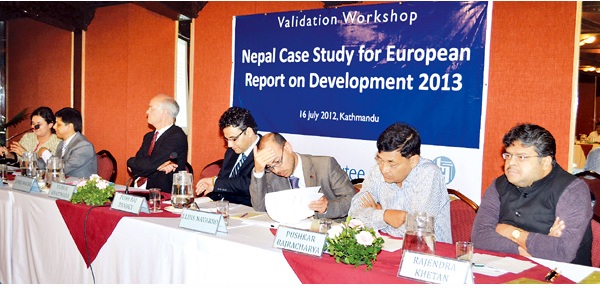
Nepal ‘less likely’ to meet MDGs on employment, climate change
Although Nepal is on track to meet most of the Millennium Development Goals (MDGs) by 2015-end, targets on employment and climate change are less likely to be achieved, according to a case study carried out by the South Asia Watch on Trade, Economics and Environment (SAWTEE) and the Centre for the Study of Labour and Mobility (CESLAM).
A validation workshop on ‘Nepal Case Study For European Report on Development’, organised by SAWTEE and CESLAM in order to discuss the findings of the case study take suggestions from various stakeholders.
The study assesses the progress made since 1990s, the key drivers and obstacles for it, and the role of external actors and impact of MDGs. It also looks at the constraints and opportunities faced by the economy and the possibilities for external actors to better support national development strategies.
Presenting the major findings of the case study, Ratnakar Adhikari, chief executive director of SWATEE, stressed on the need for scaling up the absorptive capacity and need assessment, stop frequent transfer of staff in government bureaucracy and increase ownership of development projects. In the international level, he said development partnership should provide enabling environment and not intrude on policy space.
Another presenter, Bandita Sijapati, research director at CESLAM, focused on migration and argued that at the domestic level, a migrant’s rights and welfare have to be protected if migration is unavoidable. At the international level, Sijapati emphasised on promoting initiatives that would help channel remittances into productive sectors and strengthen regional initiatives to secure rights and welfare of migrants, among others.
Highlighting the objective of the study, James Mackie, senior adviser at EU Development Policy and lead author of European Report on Development 2013, said the study aims to evaluate progress made so far in meeting MDGs, learn from the experiences and use it to frame post 2015 development agenda. “The goal is to think beyond MDGs and aid in order to suggest a framework for the future, and in Nepal’s case the relationship between Nepal the EU development cooperation,” said Mackie.
Published on: 17 July 2012 | The Kathmandu Post


GET IN TOUCH